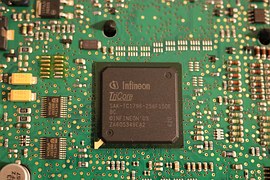A majority of people have seen and are familiar with warships, fighter aircrafts, battle tanks, and submarines in action, either directly or via television or films. But fight involving the use of radar emissions and radio waves is also going on in the atmosphere. This silent battle of beams which uses focused energy such as laser light, radio waves to confuse or disable enemy’s electronics is commonly called electronic warfare (EW). Electronic warfare uses entire range of electromagnetic spectrum. Hence it is sometime also known as electromagnetic warfare. Electronic warfare equipment began to be developed back during World War – II, since then electronic warfare system has become more specialized and sophisticated. Electronic Warfare is a military action which involves the use of electromagnetic energy to control, exploit, decrease, or avoid the hostile use of electromagnetic spectrum and it also involves sensing the radar of an incoming missile and listening i.e. collecting an enemy’s radio signals.
Request Free Report Sample@ http://www.futuremarketinsights.com/reports/sample/rep-gb-1806
Global Electronic Warfare Market: Drivers
Development in the electromagnetic spectrum drives the use of electronic equipment and associated weapon systems which are required to sense and counter these weapons that is included among the factor driving the electronic warfare market growth. Increasing adoption of visual and infrared techniques such as laser and other technologies are expected encourage the growth of electronic warfare market. Electronic warfare has become an essential requirement of strategic landscape for all war fighters. Situations such as political conflicts, territorial disputes, and cold-wars are expected to positively impact the electronic warfare market. Increasing popularity of small electronic systems that can be integrated within platforms such as unmanned systems is also expected to drive electronic warfare market growth. Other factors that has a positive impact on the electronic warfare market include increased system reliability, efficiency and effectiveness due to the introduction of travelling-wave tube- (TWT) technology used for electronic warfare application, and emergence of cognitive electronic warfare technology.
Request For TOC@ http://www.futuremarketinsights.com/toc/rep-gb-1806
Global Electronic Warfare Market: Restraints
Lack of technical knowhow, adaptability to the new technology and the laws formed to limit the investment dedicated to the R&D in this sector in some regions are included among a few restraints that negatively impact the growth of global electronic warfare market.
Global Electronic Warfare Market: Segmentation
Global electronic warfare market can be segmented into category types, product, platform, and region. On the basis of category types, global electronic warfare market can be segmented into electronic protection, electronic warfare support, and electronic attack system. Based on product, global electronic warfare market can be segmented into jammer systems, radar warning receivers, directed energy weapons, and others. By platform, electronic warfare market can be segmented into naval, airborne, ground, and unmanned. On the basis of region, global electronic warfare market can be segmented into North America, Latin America, Western Europe, Eastern Europe, Asia Pacific, Japan, and Middle East and Africa.
Global Electronic Warfare Market: Regional Outlook
As of 2015, North America is dominating the electronic warfare market. Asia Pacific is expected to have the highest growth rate. Electronic warfare market is mainly driven by the population base in the region, growing economy, increasing investments in the development of electronic warfare products, and a large number of R&D activities in the APAC region
Browse Full Report@ http://www.futuremarketinsights.com/reports/electronic-warfare-market
Global Electronic Warfare Market: Competition Landscape
Key vendors of global electronic warfare market include BAE systems Plc., Harris Corporation, General Dynamics, Elbit Systems, Lockheed Martin, Raytheon, Northrop Grumman, Boeing, Cobham Plc., and Tata Power SED. Global electronic warfare market is highly fragmented with several players focusing on joint ventures, mergers and acquisitions as a part of their growth strategy.

